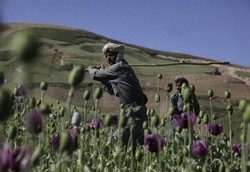A Syringe Half-full or Half-empty?

A small victory in the war on drugs? A sign of a significant strategic victory in Afghanistan? Really? Maybe.
Afghanistan exports over 90% of the world's heroin product and the opium market constitutes, by some estimates, about 50% of Afghanistan's GDP. Yet, recent news in The Economist may herald a welcome change:
OPIUM poppy cultivation in Afghanistan has fallen by a fifth since 2008 to 123,000 hectares, according to the UN's annual survey released on Wednesday September 2nd. The biggest reason for cheer is Helmand province, where cultivation has decreased dramatically from 103,590 hectares to 68,833 hectares. Opium production has dropped less, by 10% to 6,900 tonnes, because farmers are extracting more opium per bulb. This is still far above the annual global demand of 5,000 tonnes, and oversupply and lower market penetration in Europe have pushed opium prices to their lowest levels in ten years.
However, these new gains constitute a significant strategic victory only if at least three other conditions are met:
1) The war against Afghan cannabis production and the Taliban's illegal trade in gemstones and timber turns a corner.
2) Afghan drug cartels are decommissioned permanently.
3) New opium markets do not appear or simply reemerge elsewhere (i.e.Iraq and Myanmar).
If those conditions are not met, then it's tough to argue that the Taliban have been weakened in any significant way, let alone that a gain has been made in the war on drugs.
(AP Photos)





